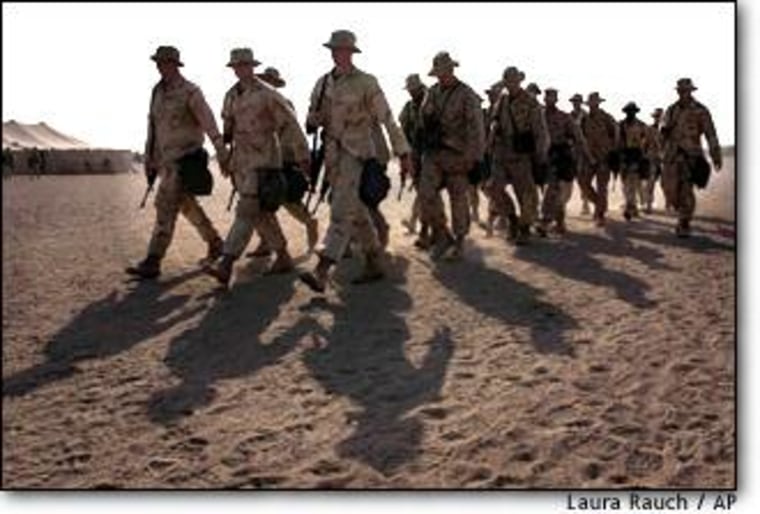In a sandstorm and broiling heat, the 3rd Battalion of the 5th Regiment of the 1st Marine Division headed north toward the Kuwait-Iraq border Tuesday, accompanied by Kung Pao, a chicken who serves as the battalion’s low-tech early warning system of a chemical or biological weapons attack.
Kung Pao -- and a pigeon who serves as his backup — is more sensitive to such weapons than humans, so if the bird inexplicably becomes ill, the troops know they need to don their gas masks quickly.
The Marines are taking as few chances as possible about potential chemical or biological warfare. Although the temperature Tuesday reached the high 90s, all the troops were wearing their chemical weapons suits.
Assuming they get the order to cross the border, once in Iraq they will wear the cumbersome clothing 24 hours a day. Although they won’t be wearing their gas masks, they’ll don them whenever incoming artillery strikes nearby.
For now, the real threat for the troops is not Iraqi fire or the sandstorms whipped up by the 35- to 40-mile-per-hour winds, but rather the rising desert temperatures.
If you add the body heat inside the chemical weapons suit and the gas mask, plus they’re inside armored vehicles, plus the fact that temperatures outside can get up over 100 degrees, it is going to be stultifyingly hot, and Marine officers fully expect that some people — probably journalists first — are going to be passing out in the back of these armored vehicles.
A MASSIVE ARMADA
Although journalists are not allowed to reveal the unit’s location, the Marines were about 25 to 30 miles from the Iraq border at the beginning of the day Tuesday. The move north appeared to be keyed by President Bush’s speech to the nation Monday night and whatever orders came out of Washington in its aftermath.
We have been in a massive convoy — really more like an armada — with a series of columns of tanks, other armored vehicles and Humvees and every other kind of military hardware you can imagine.
Nearly 50,000 Marines are in Kuwait, although it is unclear how many of them were on the move Tuesday.
Meals have been primitive, basically the military’s standard issue rations (labeled euphemistically as “MREs,” or “Meals Ready to Eat”).
The midday heat disappears quickly in the desert — by early evening, it has dropped below 50 degrees, with a stiff breeze.
Some of the troops have expressed qualms about what they are facing, and a few have even questioned whether the war is the proper U.S. response to Saddam Hussein. But most say they are tired of waiting and want to either move north — toward Baghdad — or south toward Kuwait and home.
And most know now that until they head north, there will be no chance to return home.
(Chip Reid is a correspondent for NBC News embedded with the 1st Marine Division in northern Kuwait.)
